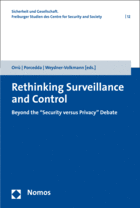After almost two years, I’m glad to say that the edited volume “Rethinking Surveillance and Control. Beyond the ‘Security versus Privacy’ Debate” has finally been published – so please indulge me by suffering some self-endorsement. The book was edited in cooperation with Elisa Orrù, a colleague here at Freiburg’s Centre for Security and Society, and Maria Grazia Porcedda, who by now, is a research fellow at the University of Leed’s School of Law, previously at EUI. The book is based on the contributions to the FRIAS Junior Researchers Conference the three of us organised together back in November 2015. The publishing of the book was generously funded by FRIAS and the Centre for Security and Society.
Elisa Orrù, Maria Grazia Porcedda, Sebastian Weydner-Volkmann (Eds.): Rethinking Surveillance and Control. Beyond the 'Privacy versus Security' Debate. Sicherheit und Gesellschaft Volume 12. Baden-Baden: Nomos 2017. (ISBN 978-3-8487-3506-8)
Abstract
The book is based on the premise that the metaphor of a trade-off between privacy and security (as it is so often used in politics) is not only unsound, but that it also conceals important aspects of the surveillance and control measures in question. Accordingly, the contributors to the edited volume analyse the symbiotic relationship between privacy and other liberties on the one side and security on the other. This underscores the emptiness of those concepts when considered in isolation. The contributions explore and contextualise different notions of risk, surveillance and control practices as well as the value of the rights to private life and data protection. Taken together, the contributions to the volume offer a kaleidoscope of perspectives, ranging from critical studies to international relations, law, philosophy and sociology.
Through contextualisation, going much further beyond the simplistic argument of having to “balance privacy against security”, the contributions show that surveillance and control measures neither (in a mono-dimensional sense) necessarily attain security, nor always pose a threat to privacy. And conversely, they show that protecting privacy does not necessarily hamper the provision of security. Instead, surveillance and control practices, mediated through technology, express and sustain specific power relationships and imply specific ethical, legal and societal conflicts that must be spelled out for the context in question.
Some (self-endorsing) features of the book
- The book is highly topical, addressing the socio-political debate around the costs and benefits of measures of surveillance and control
- It challenges the common conception that security can only be gained by giving up privacy and, conversely, that strengthening privacy and other fundamental rights hampers the provision of security
- The book assembles contributions from across Europe and beyond
- The book contributes to surveillance and control-related research topics such as privacy, data protection, power and issues of risk governance
- The book also looks at data protection from a practitioner’s point of view, thanks to the contribution of the former Data Protection Commissioner for the State of Baden-Württemberg Jörg Klingbeil.
Table of Contents
Foreword Reinhard Kreissl Introduction Elisa Orrù, Maria Grazia Porcedda, Sebastian Weydner-Volkmann Beyond Balance: Targeted Sanctions, Security and Republican Freedom Patrick Herron Risk Based Passenger Screening in Aviation Security: Implications and Variants of a New Paradigm Sebastian Weydner-Volkmann Debating Surveillance: A Critical Analysis of the post-Snowden Public Discourse Thomas Linder The Schengen Information System and Data Retention. On Surveillance, Security and Legitimacy in the European Union Elisa Orrù The Recrudescence of ‘Security v. Privacy’ after the 2015 Terrorist Attacks, and the Value of ‘Privacy Rights’ in the European Union Maria Grazia Porcedda Practical Experiences in Data Protection Jörg Klingbeil Monitoring or Selecting? Security in Italy between Surveillance, Identification and Categorisation Enrico Gargiulo Domestic Surveillance Technologies and a New Visibility Michele Rapoport
